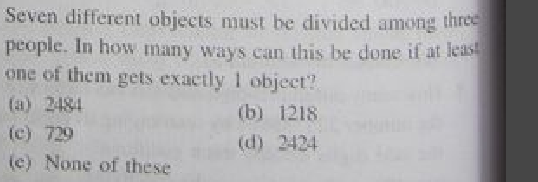7 different objects must be divided among 3 people .In how many ways can this be done if at least one of them gets exactly one object?
3c1*7c1 = fixing one person for one object
2^6 coz of six objects remaining for two persons
21 * 2^6 this is my answer coming.
where am i wrong
3c1*7c1 = fixing one person for one object
2^6 coz of six objects remaining for two persons
21 * 2^6 this is my answer coming.
where am i wrong

